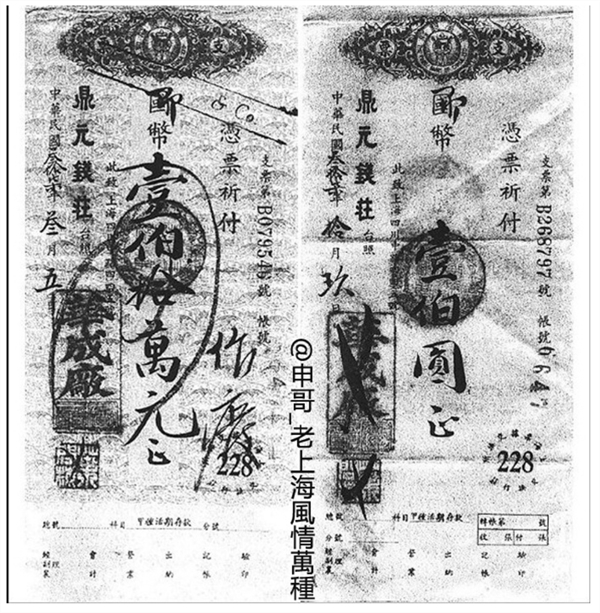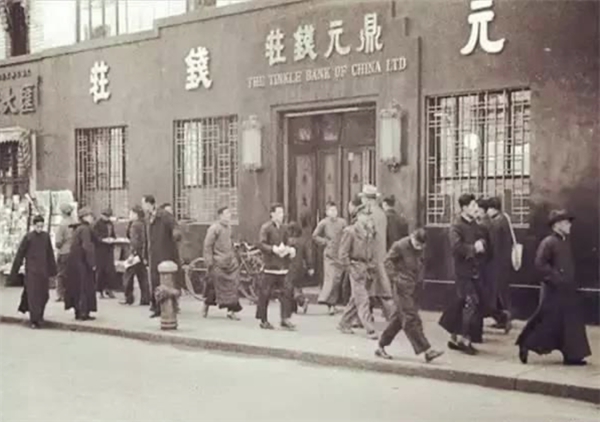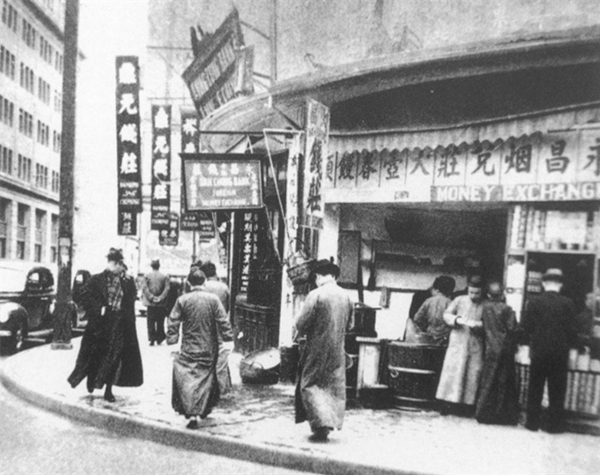The Tinkle Bank at the intersection of Ninbo Road and Sichuan Road in Shanghai was the hub of a financial front of the Communist Party of China at the eve of the liberation. The owner of the bank, Xu Zhendong, was a patriotic democrat and a loyal friend of the party, although he didn't join it in his life.

(Bill from the Tinkle Bank)
Opened after the War of Resistance against Japanese aggression, the bank was one of the secret vaults of the party in Shanghai, undertaking important tasks of collecting money and goods and accommodating revolutionaries. It was also a witness to the friendship between Xu Zhendong and a group of notables from the party.
Early progressive work in Guilin
Guilin in the early days of the War of Resistance was quite active in anti-Japanese activities and Xu Zhendong was then a student of Guangxi University. Due to his wide worldview that he had developed from a young age, Xu opened two bookstores where he read and sold progressive books. He reprinted pamphlets like Mao Zedong's “On Protracted War” and presented to soldiers in the front via the office of the Eighth Route Army.
It was during this period that he met CPC members Xu Xuehan (one of the secret leaders in CPC's cultural and financial fields) and Deng Kesheng, who were respectively running a bookstore and a publishing house under the instruction of the CPC to raise people's anti-Japanese awarness in Guilin. The three forged a deep friendship here.
Xu was active in the KMT-controlled Shanghai areas under various identities after 1941. He had close ties and a special relationship with the party, but was not yet an official member. According to Deng Kesheng's wife Zang Wen, Xu operated cultural magazines with two or three classmates in Shanghai, and also made closer ties with Deng.
When the party group, formed by Deng Kesheng, his sister Deng Ping and their friend Li Zhongrong, was transferring via Shanghai to the base area in northern Jiangsu, Xu helped them settle in Shanghai. Later, when Deng Kesheng and Deng Ping respectively finished the influential booklets “General knowledge of Economics” and “General Knowledge of Philosophy”, it was Xu who sponsored their publication.
Before the three left Shanghai, Xu mentioned joining the party and leaving with them together for the base, but the temporary party organization decided that staying in Shanghai was more convenient for Xu to do party work, and thus he remained.
Tinkle Bank for military supplies
After the War of Resistance against Japan, Chiang Kai-shek began to prepare for the civil war and recklessly issued paper money in the KMT-Control area and prohibited the circulation of silver coins that circulated in the liberated areas. Anyone who carried coins used in the liberated areas was persecuted.
The funds the CPC allocated for members in the KMT-Control area for purchasing supplies for liberated areas was of a large amount, so besides the form of foreign exchange, people could only carry paper money and gold which was too heavy and unsafe.
Therefore, the CPC decided to establish a bank to specialize in commercial business. With half the capital from Xu Zhendong's Rentai Bank, in March 1947, the Tinkle Bank opened. On the surface, it operated financial services such as bill exchange, but it was actually a secret bank and office of the CPC in Shanghai.
Records show that the bank had many important businesses, such as injecting 20% of equity funds to support the CPC to establish Po Sang Bank in Hong Kong, investing 260 taels (a tael is 50g) of gold to help left-wing writer Xia Yan to establish the Hong Kong Daguangming Film Company, and setting aside 100 taels of gold for the purchase of rubber military shoes and enamel bowls for the urgent need of the Northeast battlefield.

(The Tinkle Bank before Shanghai's liberation)
When the KMT began to aggressively attack the liberated areas, traffic was cut off and the exchange business ceased. The experienced Xu bought gold with all the bank money to prevent currency devaluation in the KMT-controlled area. Meanwhile, Xu and other comrades founded a number of enterprises to secretly raise military supplies for the People's Liberation Army.
Amidst the KMT's brutal massacre of revolutionary people, the Tinkle Bank had handed over 900 taels of gold to the party by the end of 1948 due to Xu's flexible management, and the principal of CPC's investment was fully recovered with a surplus.
Wife aids revolutionary cause
Due to its confidentiality, the bank also became a secret transfer station for CPC members, including revolutionary activist Liu Jiping and his wife, writer Ai Hansong and Lou Shiyi.
Deng Kesheng's wife Zang Wen also recalled that Xu not only accommodated CPC members with board and lodging, but also paid for other events at his own expense. For example, Li Zhongrong's wedding in Shanghai was paid by Xu. When writer Xia Yan's family members stayed in Shanghai, Xu also paid their regular living expenses. When revolutionary activist Liu Jiping arrived in Shanghai with his wife left behind in Guilin due to a lack of travelling expenses, Xu immediately remitted some money to her.
Xu once said,“as long as I know that my comrades have difficulties, I will donate generously without hesitation." As Xu Xuehan once commented, he always accepted the tasks without hesitation, even if it endangered his life.
Without his wife Chen Zhiwei, Xu could hardly have accomplished the important task of lodging revolutionaries under the enemy's very noses.
The clothing of many comrades from the base area in northern Jiangsu was not like those from modern Shanghai, so, to avoid suspicion, Xu and his wife altered their clothes for them. Zang Wen recalled that when she came to live in Shanghai from northern Jiangsu, Chen Zhiwei offered to take her to buy clothes, but she declined due to financial stress. Unexpectedly, Chen sat before the sewing machine overnight to alter her own clothes for her to wear.

(Signboard of the Tinkle Bank at the corner of Sichuan Road)
Once Chen, under Xu's request, accompanied a revolutionary to purchase supplies, and when entering a woolen yarn shop, she noticed someone was tailing them. She immediately winked at the companion to indicate to speed up and enter an alley and got rid of the enemy. Living in a dangerous environment for a long time, Chen became vigilant. “As soon as we went in, two men followed. I doubted that men would visit a woolen yarn shop,”she said.
On May 27, 1949, Shanghai was liberated, so the Tinkle Bank had completed its mission. Although Xu Zhendong did not join the CPC, he had always strictly abided by the CPC's work discipline and secrets. It was not until after 1976 that he explained this experience to the party organization of his company in his resume. His contribution to the cause of liberation is indelible.
Story by Xiong Fangyu, Kong Wenlong
Translation by Zheng Qian
